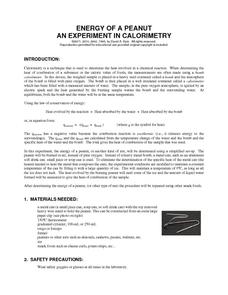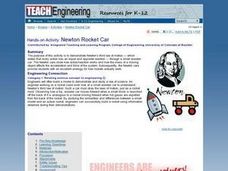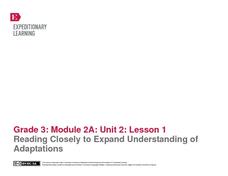Teach Engineering
Changing Fields
Eddy currents, Faraday's Law and Lenz's Law provide the connection between train brakes and and MRI machines in a lesson that asks teachers to provided the material needed so the pupils can understand the properties of changing magnetic...
Teach Engineering
Archimedes' Principle, Pascal's Law and Bernoulli's Principle
What do Pascal's law, Archimedes' Principle, and Bernoulli's Principle have to do with fluid mechanics? The included PowerPoint presentation provides the basic definitions and equations associated with the three. A set of homework...
National Nanotechnology Infrastructure Network
Understanding Wave Motion - Slinky vs. Snaky: Which Spring is Dominant?
Ride the wave to an understanding of refraction! The first in a series of two inquiry-based lessons challenges learners to create transverse waves with two different types of springs. As their wave hits an object, they observe the change...
Teach Engineering
Equal and Opposite Thrust in Aircraft: You're a Pushover!
It's the law—every action requires a reaction, no matter how small. Pupils experience two demonstrations of Newton's third law of motion as it relates to thrust in the 10th segment of a 22-part unit on flight. Using their mathematical...
Deliberating in a Democracy
Parental Liability
How many teenagers have wanted their parents to let them make their own decisions? The answer is ... all of them! Scholars investigate where parental liability begins and ends in the eyes of the law. Using case studies and legal...
Curated OER
Newton's Third Law
In this Newton's Third Law worksheet, students complete a table identifying the action force and reaction force of several examples. Students demonstrate a basic understanding of Newton's Third Law by filling in missing blanks and...
Wind Wise Education
Understanding Forms and Sources of Energy
What is the difference between a form of energy and a source of energy? This first activity in a series of 19 lessons uses demonstrations and discussions to introduce energy to the class. Through using hand-generator flashlights,...
Chymist
Energy of a Peanut
Are you nuts? An engaging experiment burns nuts to find their kilocalories. Young chemists analyze at least two different types of nuts with their experimental results versus what is on the package. The resource offers a great lab for...
Facing History and Ourselves
Civil Rights Historical Investigations
The murder of Emmett Till, the Selma to Montgomery march, and the desegregation of Boston schools are the focus of three units that ask class members to investigate why these events were so key in the struggle for civil rights. Groups...
Curated OER
What's Legal with Music on the Web?
Student research legalities of downloading music from Internet, gather information on citizens who have been charged with downloading/copyright crimes, find out who is working to create new laws dealing with this technology, explore what...
Curated OER
MP3-Ring Circus
Students explore the meaning of copyright and copyright issues surrounding the use of downloaded music.
Curated OER
Behind the Music 2000
Students discuss copyright issues and how technological advancements have affected music.
Curated OER
Newton Rocket Car
Young scholars observe a demonstration of Newton's third law of motion using a small wooden car. They discuss Newton's third law of motion and what happens to motion if the mass or acceleration is increased, construct their car, and...
Curated OER
Completing the Circuit
Students use a battery, wires, small light bulb and a light bulb holder to learn the difference between an open circuit and a closed circuit, and understand that electric current only occurs in a closed circuit. They describe the...
Teach Engineering
Exploring Energy: Energy Conversion
The energy is not really lost, it is just converted to a different form. Pupils learn about the conversion of energy in the fifth segment of an energy unit with six parts. Learners develop an understanding of the conservation of energy...
Teach Engineering
Can You Resist This?
Some things are hard to resist. Small collaborative groups build circuits and calculate the voltage using Ohm's Law. Budding engineers explore the connection between the voltage across different resistors and linear functions with...
Teach Engineering
Energy Storage Derby and Proposal
Small groups use the engineering design process to build and test a vehicle capable of carrying 250 grams a distance of five meters. The design must allow for the storage of potential energy and turn it into motion, allowing the...
EngageNY
Reading Closely to Expand Understanding of Adaptations
Third graders work to determine the main idea, recall key details, and answer questions using an informational text on the topic of animal adaptations. Using the non-fiction text "Staying Alive: Animal Adaptations" (provided) the teacher...
Curated OER
Math in English Skills III Exercise Book: Understanding Fractions
Fractions can be tricky, and there is no better way to tackle tricky topics than with a visual representation. Intended for learners in grades two and three, this set of printable worksheets provides a variety of fractions represented in...
Curated OER
Understanding and Using Red And Black Words
In this understanding and using red and black words worksheet, students view a "Macmillan Dictionary" and observe all the different red and black words found in the dictionary. Students answer twenty-five questions about the colored words.
Curated OER
Wyclef Jean for VH1 Storytellers
Learners watch a video with Wyclef Jean. They identify lawful uses of copyrighted materials and explain the interrelated roles of composer, lyricist, publisher, performer, agent, and record company.
Teach Engineering
Viscous Fluids
Elasticity and viscosity. Help your class understand the similarities and differences with an introduction to viscous fluids. After describing four types of fluid behaviors: shear thinning, shear thickening, Bringham plastic, and...
Teach Engineering
Density and Miscibility
The liquids did not mix — so what do density columns have to do with it? The seventh part in a series of nine provides the theoretical explanation of why density columns do not mix. The lesson covers the topics related to mixing and...
Curated OER
Word Problem Practice Workbook
Need worksheets that challenge your middle schoolers to apply their understanding of math? Problem solved! From integers, fractions, and percents, to algebra, geometry, and probability, over 100 pages of word problem worksheets are...

























